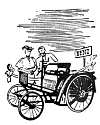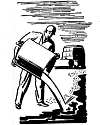 About this time men were working on the development of a
self-propelled vehicle. But they needed an engine which could use
some sort of fuel that was plentiful and inexpensive. The steam
engine didn't seem to be the answer. Dunlop
had already solved the tire problem and the year of the Centennial
in Philadelphia, America heard of the internal combustion engine -
an engine that used gas as fuel. Some ten years later vehicles
propelled by this type of engine were being built and, at the Chicago
World's Fair in 1893, many Americans saw the horseless carriage for the
first time.
About this time men were working on the development of a
self-propelled vehicle. But they needed an engine which could use
some sort of fuel that was plentiful and inexpensive. The steam
engine didn't seem to be the answer. Dunlop
had already solved the tire problem and the year of the Centennial
in Philadelphia, America heard of the internal combustion engine -
an engine that used gas as fuel. Some ten years later vehicles
propelled by this type of engine were being built and, at the Chicago
World's Fair in 1893, many Americans saw the horseless carriage for the
first time. With tires and engines available there was still no real supply of fuel
in sight. Unknowingly the petroleum refiners in this country provided
the answer. In refining petroleum to get kerosene they had a
troublesome by product - gasoline. They could find no use for gasoline
or even a way to get rid of it. You could have all you wanted if you
would haul it away. In fact, laws had to be passed to keep the refiner
from dumping gasoline into rivers and harbors. Government inspectors
were on hand at every refinery to see that none of this volatile
material got into the kerosene.
With tires and engines available there was still no real supply of fuel
in sight. Unknowingly the petroleum refiners in this country provided
the answer. In refining petroleum to get kerosene they had a
troublesome by product - gasoline. They could find no use for gasoline
or even a way to get rid of it. You could have all you wanted if you
would haul it away. In fact, laws had to be passed to keep the refiner
from dumping gasoline into rivers and harbors. Government inspectors
were on hand at every refinery to see that none of this volatile
material got into the kerosene.Now this gasoline, that was such a great nuisance to the refiners, was a very good fuel for the new internal combustion engine and, as the automobile and airplane developed, the "by-product" gasoline became more and more important each year. Now it is one of our most important civilian and military materials. |








